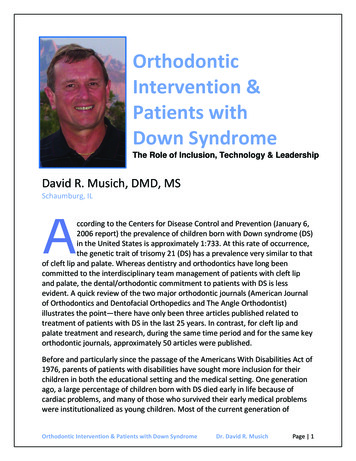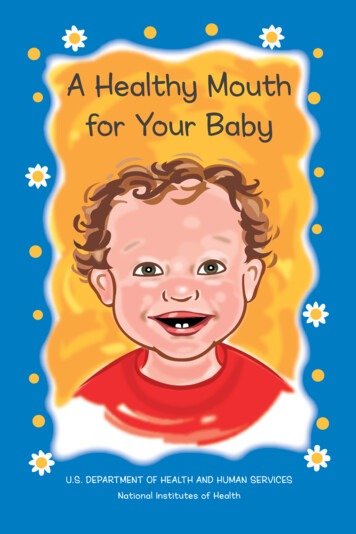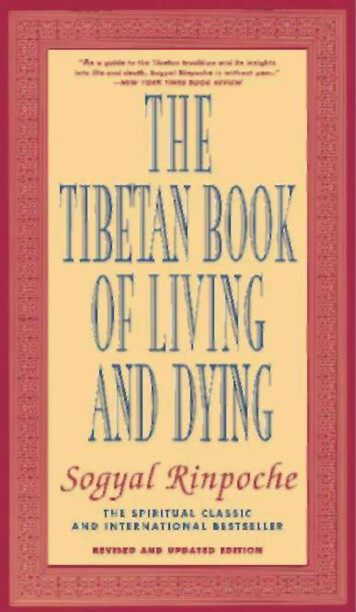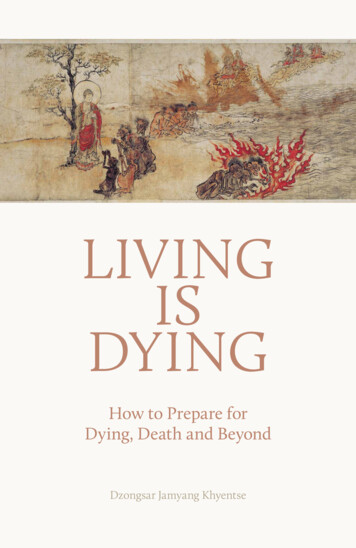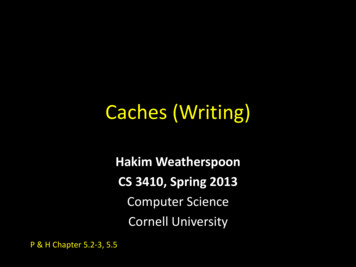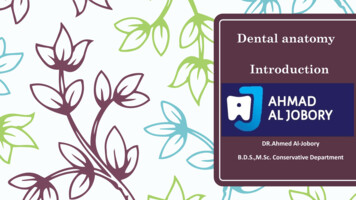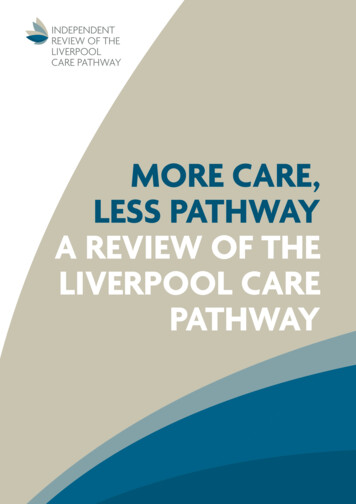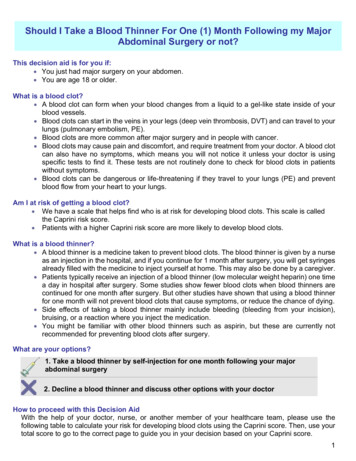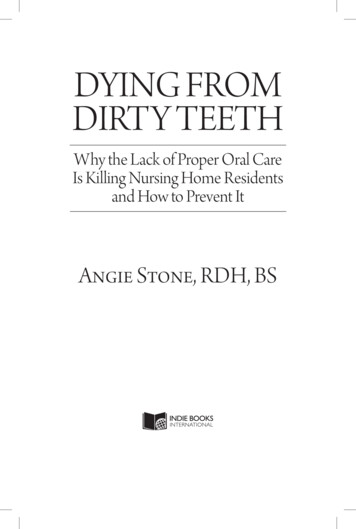
Transcription
Dying FromDirty TeethWhy the Lack of Proper Oral CareIs Killing Nursing Home Residentsand How to Prevent ItAngie Stone, RDH, BS
Copyright 2015 by Angie Stone.All rights reserved.Printed in the United States of America.No part of this publication may be reproduced or distributed in any forms or any means,without the prior permission of the publisher. Requests for permission should be directedto permissions@indiebooksintl.com, or mailed to Permissions, Indie Books International,2424 Vista Way, Suite 316, Oceanside, CA 92054.Neither the publisher nor the author is engaged in rendering legal or other professionalservices through this book. If expert assistance is required, the services of an appropriateprofessionals should be sought. The publisher and the author shall have neither liabilitynor responsibility to any person or entity with respect to any loss or damage causeddirectly or indirectly by the information in this publication.ISBN: 1-941870-11-2ISBN 13: 978-1-941870-11-2Library of Congress Control Number: 2015931105Designed by Joni McPherson, mcphersongraphics.comINDIE BOOKS INTERNATIONAL, LLC2424 VISTA WAY, SUITE 316OCEANSIDE, CA 92054www.indiebooksintl.com
This book is dedicated to my mother-in-law, Gladys Stone,Grandmother Helen Schrantz, and longtime patient, friend, andsupporter Ed Shaw. Without the needless suffering of Gladys andHelen and the opportunity to change that path for Ed, the vitalmessage of this book would not have come to fruition. The three ofthem provide constant guidance from above. I feel their presence.From left to right: Gladys (2003), Gram (2012), and Ed (2013).
Table of ContentsForewordAcknowledgementsChapter OneThe Monster ProblemChapter TwoThe Ticking Time BombChapter ThreeSound the AlarmChapter FourCertified Nursing Assistant Oral Care TrainingChapter FiveOral Care In-Service TrainingChapter SixXylitol and Professional Weekly Oral CareChapter SevenCase StudiesChapter EightBenefits to the Dental CommunityChapter NineFunding Oral CareChapter TenIt Is All About the 5About the Author89
ForewordThe plight of the nursing home resident has been in theforefront of my mind for nearly two decades. As morepeople enter care facilities with more teeth, teeth with expensivedentistry, and an impaired ability to take care of their own oralhealth, palliative help for oral care must find a place in thefacilities. As researchers find more system wide consequencesfrom poor oral biofilm management and economists discoverthe true costs of poor oral hygiene, improvements in the statusquo become even more imperative. Losing a tooth to poor oralhygiene, it turns out, is the least of the problem.In this seminal book, Ms. Stone, lays it all on the line. Usingcases she herself has experience with, she proves that thingscan be different. There are other hygienists in the landapproximating what Stone is doing, but no one puts the samelevel of passion and the wherewithal to come out loud andstrong offering solutions workable in today’s word as well asoffering solutions for the future.
xiiDYING FROM DIRTY TEETHDental hygienists are highly skilled and motivated by cleanteeth. They are women and men who signed up to work onthe biofilm that accumulates on teeth. As a matter of fact,the profession of dental hygiene was invented to removethe debris on teeth so the dentists would have less work andcould see the teeth he was about to work on. It seems oddthat so many women have taken on the role of oral biofilmwranglers but they did. And most love their work. Ms. Stoneshows us a workforce model that activates the vast number ofdental hygienists who are currently under employed.The message is clear, people with teeth live longer and peoplewith teeth live better. There are many ways to die, some moredignified than others, but we all agree that dying from dirtyteeth is not only undignified, it’s wrong.Thank you Angie Stone, RDH, BS for putting your facts andfeelings into words on a page. Bring out your highlighter, ohgentile reader, you’re going to need it.Shirley Gutkowski, RDH, BSDHFebruary 2015
AcknowledgementsThe thought of writing a book never even crossed my mindand now I hold my very own book in my hands. I certainlycould not have accomplished this alone. Many people wereinstrumental in making this book a reality. Special thanks to:Shirley Gutkowski for her ever present guidance and placingthe idea in my head that I could write a book.Beth Thompson and Shirley Gutkowski for having MichellePrince as keynote speaker at CareerFusion.Kris Potts for believing I had a book in me and dragged mealmost kicking and screaming to Michelle’s book writingconference.Michelle Prince for an amazing Book Bound conference andbook mind mapping experience.Patti DiGangi for being a constant “connector” andintroducing me to Henry DeVries and Mark LeBlanc.
xivDYING FROM DIRTY TEETHJennifer Rinker for spending her time and energy on beingmy personal proofreader and editor.My long time employer, colleague, and friend, Dr. JohnDubats, for seeing I was capable of more than providingdental hygiene services, for encouraging me to follow mypath and being selfless in the process.My husband, Jay, for his constant encouragement and supportof my ideas and goals, even though he doesn’t always knowwhere they are going to lead. Also for dealing with the timesI am in “Angie World.”My parents, Nicki and Jim, children Ashley and Spencer,brother Jim, and Aunt Andrea for always believing that I cando anything I decide to do and for always being there for me.And of course, I would not be successful without theunconditional love I have received from each of these peopleand the countless others who have loved and supported mealong my journey.
Chapter OneThe Monster ProblemThere is an epidemic going on among nursing homeresidents. This condition is making them sick and isleading to death. The situation has been happening for years;the problem is only getting larger, yet residents and familymembers remain unaware of it. Even the caretakers at nursingfacilities are often times unaware of the magnitude of this issue.Gladys became so physically ill with Chronic ObstructivePulmonary Disease (COPD), at age sixty-three, she neededto move into a nursing home environment. As Gladys’soral health deteriorated, so did her lung health, or maybeit was vice versa, but the two conditions were definitelyrelated. When the mouth is infected, the bacteria that causethe infection can easily be transferred into the lungs. Thiscan compromise the health of the lungs and result in lung
2DYING FROM DIRTY TEETHinfections such as pneumonia. Couple this with lungs thatdo not work well due to COPD and the result can be deadly.Eventually Gladys’s lung infections occurred closer andcloser together. Each infection became harder and harder toresolve. The prescribed antibiotics got stronger and stronger.Eventually nothing more could be done, and Gladys lost herlife to COPD. Or did she die from dirty teeth?Ida broke her leg when she was 102 years old. It was logicalto think this may be the beginning of the end of her life.Situations like this can often bring that on. But she recoveredafter three months of therapy. Shortly after that Ida contracteddouble pneumonia and she wasn’t expected to make it, butshe did. The antibiotics however had managed to kill off thegood bacteria in her mouth and let the yeast take over. A yeastinfection in the mouth is called thrush. Ida was in such painshe could not eat. She died of starvation. Or was it from thecondition of her mouth?Helen was placed in a nursing home. She was able to floss andbrush her teeth, and was under the care of the nursing teamand the nursing home dentist. She never had trouble withher teeth or gums. As her medications increased, her mouthbecame more and more dry. There are over 700 prescriptiondrugs that cause dry mouth and she was on approximatelyseven of them. Even though she was legally blind and her bodydid not work well enough to allow her to walk, her biggestcomplaint was her dry mouth. The care team offered what
Chapter OneThe Monster Problemthey knew to address the problem, but it was not enough.When there is not enough saliva to control the bacteria in themouth, teeth get cavities, and cavities need to be filled by adentist. Helen was on Medicare. There are very few dentistswho take this benefit for payment of services. As a result, thecavities were not filled. When teeth have cavities that are notfilled, they break. As her teeth broke, her daughter would takeher out to a private dentist for care, because a broken toothwas an emergency. Recommended treatment was alwaysremoval of the tooth in question. This was a vicious cycle,and one that no one, not the care team or the dentist, hadany answers to. As a result, in the two short years Helen spentin the facility, she had lost 60 percent of the teeth she hadmanaged to keep healthy for 90 years. She, like Gladys andIda, had become a victim of our broken system of nursinghome oral care and suffered needlessly from dental disease.Helen went to her final resting place with no front teeth, andcavities in the teeth that remained. While Helen did not diefrom dirty teeth, her dirty teeth certainly affected her qualityof life. Can a poor quality of life decrease the will to live?The Results from a Lack of Good CareThe lack of good oral hygiene is killing our elders and theailment is completely preventable. Oropharyngeal bacteria arewreaking havoc. These bacteria can be controlled, and typicallyare controlled by most people through brushing and between3
4DYING FROM DIRTY TEETHthe teeth cleaning. However, once people become dependenton others to remove these bacteria, the microbes run wild inthe mouth, because they are not being kept at bay on a dailybasis with tooth brushing and between the teeth cleaning.The greatest risk of dying from dirty teeth comes whenthe bacteria in the mouth get aspirated into the lungs andthe person contracts aspiration pneumonia. Aspirationpneumonia is a lung infection that is a result of oral bacteria,stomach contents, or both, being inhaled (aspirated) intothe lungs. It is not unusual for small amounts of this materialto trickle or be inhaled into the airway and into the lungs.In the general population the inhaled secretions have lowbacterial count and are usually cleared out by normal defensemechanisms such as coughing. Bacteria are not allowed toreach the lungs to cause inflammation or infection.This process is quite different with elders who haveoral secretions containing high levels of bacteria and acompromised immune system. When an abnormally highamount of bacteria are aspirated and gain access to theairway, it can cause serious consequences. Elders cannoteasily clear the microbes out of their respiratory tract.Bacterial pneumonias are strongly associated with aspirationof bacteria into the lower respiratory tract, which is normallya sterile environment. When this happens the result isaspiration pneumonia.
Chapter OneThe Monster ProblemInfected and decayed teeth, as well as poor oral hygiene, havebeen correlated with the occurrence of aspiration pneumonia.Missing teeth and poorly fitted dentures predispose eldersto aspiration by interfering with chewing and swallowing.When food is not properly chewed and swallowed it isallowed to remain in the mouth and break down. Aspirationof decomposing food that is laden with bacteria can lead topneumonia as well.Another issue our elders face in care facilities is oropharyngealcandidiasis or “oral thrush.” This occurs when there is anover growth of yeast in the mouth. This also tends to be aminor problem in a healthy individual, but in the weakenedimmune system of a dependent adult, the symptoms of oralthrush may be more severe and difficult to control. Thrushoccurs commonly in seriously ill and dying patients, but canoccur in people of any age. Some of the risk factors for thrushinclude xerostomia (dry mouth), diabetes, use of antibiotics,dentures, and old age. A person who has thrush may notrealize it until the outbreak is severe. At this point they noticepain, dysphagia (trouble swallowing), halitosis (bad breath),changes in the taste of food, diminished appetite, and reducedability to consume food. The lack of taking in nutrition canlead to weight loss, eventual starvation, and death.Even if elder care residents are not dying as a result ofthese masses of uncontrolled bacteria, they are sufferingneedlessly from cavities and periodontal (gum) disease5
6DYING FROM DIRTY TEETHbecause the bacteria in their mouths are being allowed to runamuck. When these bacteria cause periodontal disease, thedestruction does not end in the mouth. A number of researchstudies show that teeth and gums burdened with the bacteriathat cause periodontal disease can initiate cardiovasculardisease, stroke, diabetes, and dementia. These bacteria canalso complicate the control of existing diabetes.Periodontal disease occurs when bacteria are allowed tothrive in the mouth and create a biofilm in which to live anddo their dirty work. Once the body realizes the bacteria aredoing damage, the immune system releases substances thatinflame and damage the gums, the ligaments around the teeth,and eventually the bone that support the teeth. The bodydoes this in an attempt to get rid of the bacteria. The release ofthese substances leads to swollen, bleeding gums, which aresigns of gingivitis (the earliest stage of periodontal disease).If bacteria are not controlled at this point, the damage maycontinue resulting in full blown periodontitis (the advancedstage of periodontal disease) which is marked by loss of thebone around the teeth. This can cause teeth to become loose.Eventually teeth may be lost.There are several causes of death that can be associated with poororal health, including heart disease, stroke, diabetes, chronicobstructive pulmonary disease (COPD), and dementia.
Chapter OneThe Monster ProblemHeart Disease: Several studies have shown that periodontaldisease is associated with heart disease. Research has indicatedthat periodontal disease increases the risk of the developmentof heart disease. Scientists believe that inflammation causedby periodontal disease may be responsible for the association.The development of periodontal disease can also worsenexisting heart conditions.Stroke: Additional studies have pointed to a relationshipbetween periodontal disease and stroke.Diabetes: People with diabetes and periodontal diseasemay have more trouble controlling their blood sugar thandiabetic patients with healthy gums. This appears to be a twoway street. Those with periodontal disease are more likely todevelop diabetes.Chronic Obstructive Pulmonary Disease: Research hasshown those with periodontal disease have a 60 percenthigher likelihood of developing COPD than those withoutperiodontal disease.Dementia: Oral bacteria in the mouth due to poor dentalhygiene have been linked to brain tissue deterioration.Why Does Any of This Matter?Elders, in general, have increased risk factors for heartdisease, stroke, diabetes, COPD, aspiration pneumonia, and7
8DYING FROM DIRTY TEETHthrush. The lack of adequate oral care increases these riskssignificantly. While medical professionals go to great lengthsto keep our dependent elders healthy, there is a huge piece ofthe puzzle that is not only in the wrong spot, it is completelymissing. In the 2000 report, Oral Health in America, theU.S. Surgeon General pointed out that total health cannotbe attained until oral health is improved. There needs to bea movement to end this epidemic. While death certificatesdo not list oropharyngeal bacteria as the cause of death,they are most certainly the origin of many illnesses thatlead to death. There are many challenges and this problemcan seem unmanageable, however the circumstances can beturned around so elders are not dying from dirty teeth. Thisneeds to be done sooner than later. The population is agingand our baby boomers are going to be the next generation ofdependent adults.
4 DYING FROM DIRTY TEETH the teeth cleaning. However, once people become dependent on others to remove these bacteria, the microbes run wild in the mouth, because they are not being kept at bay on a daily basis with tooth brushing and between the teeth cleaning. The greatest risk of dying from dirty teeth comes when
